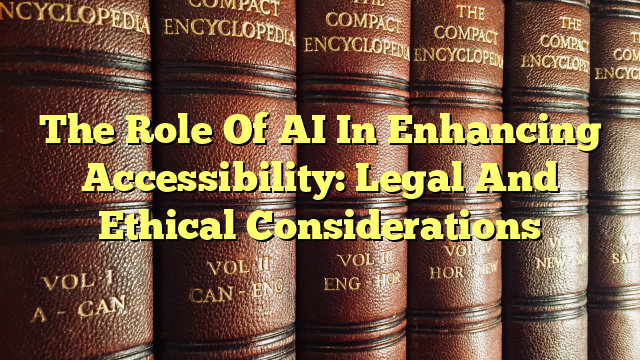Table of Contents
Ethical and Legal Considerations in AI
Artificial Intelligence (AI) has the potential to revolutionize various aspects of our lives, including accessibility for individuals with disabilities. However, as AI continues to advance, it is crucial to consider the ethical and legal implications associated with its use.
From an ethical standpoint, AI systems must be designed and implemented in a way that respects the rights and dignity of individuals. This includes ensuring that AI algorithms do not discriminate against certain groups or perpetuate existing biases. Transparency and accountability are also important ethical considerations, as AI systems should be explainable and subject to scrutiny.
On the legal front, there are several key considerations. Privacy and data protection laws play a significant role in AI, as these systems often rely on vast amounts of personal data. Compliance with these laws is essential to protect individuals’ privacy rights. Intellectual property rights, liability, and accountability are also important legal considerations in the development and deployment of AI systems.
Ethical Considerations in Use of AI Systems
When using AI systems, it is crucial to consider the potential ethical implications. One major concern is the impact of AI on employment and job displacement. As AI technology advances, there is a risk that certain jobs may become obsolete, leading to unemployment and socioeconomic inequalities. Ethical considerations require us to address these potential consequences and find ways to mitigate them.
Another ethical consideration is the potential for AI systems to invade individuals’ privacy. As AI becomes more integrated into our daily lives, there is a need to ensure that personal data is protected and that individuals have control over how their data is used. Transparency and informed consent are crucial in addressing these ethical concerns.
Additionally, AI systems must be designed to avoid bias and discrimination. Biased algorithms can perpetuate existing inequalities and reinforce societal biases. Ethical considerations demand that AI systems be fair, unbiased, and inclusive, promoting equal opportunities for all individuals.
Legal Implications of AI
The rapid advancement of AI technology has raised several legal implications. One key area is intellectual property rights. As AI systems become more capable of creating original works, questions arise regarding who owns the rights to these creations. Legal frameworks need to adapt to address these issues and provide clarity on ownership and protection of AI-generated content.
Liability and accountability are also significant legal considerations. When AI systems make decisions or take actions that have consequences, it is essential to determine who is responsible for any harm caused. Establishing clear legal frameworks for assigning liability and accountability is crucial to ensure that individuals are protected and that appropriate remedies are available.
Data protection and privacy laws are another important aspect of AI’s legal implications. As AI systems rely on vast amounts of personal data, it is crucial to comply with relevant laws to protect individuals’ privacy rights. Failure to do so can result in legal consequences and undermine public trust in AI technology.
The Role of Ethics in Artificial Intelligence
Ethics plays a vital role in the development and use of artificial intelligence. It is essential to consider the potential impact of AI systems on individuals and society as a whole. Ethical considerations guide the design and implementation of AI systems to ensure fairness, transparency, and accountability.
By addressing ethical concerns, AI can be harnessed to enhance accessibility and improve the lives of individuals with disabilities. Ethical AI systems prioritize inclusivity, avoiding discrimination, and promoting equal opportunities. They are designed to respect individuals’ privacy rights and give them control over their personal data.
Furthermore, ethics in AI also involves considering the broader societal implications. This includes addressing issues such as job displacement, socioeconomic inequalities, and

